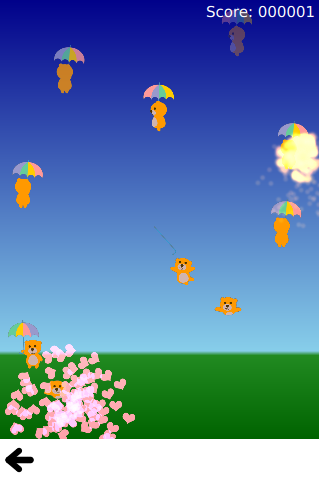A collection of QML Touch Interaction examples.

触控交互 is a collection of small QML examples relating to touch interaction methods. For more information, visit 重要 Qt Quick 概念 - 用户输入 .
要运行范例从 Qt Creator ,打开 欢迎 模式,然后选择范例从 范例 。更多信息,拜访 构建和运行范例 .
Multipoint Flames demonstrates distinguishing different fingers in a MultiPointTouchArea , by assigning a different colored flame to each touch point.
The MultipointTouchArea sets up multiple touch points:
MultiPointTouchArea {
anchors.fill: parent
minimumTouchPoints: 1
maximumTouchPoints: 5
touchPoints: [
TouchPoint { id: touch1 },
TouchPoint { id: touch2 },
TouchPoint { id: touch11 },
TouchPoint { id: touch21 },
TouchPoint { id: touch31 }
]
}
The flames are then simply bound to the coordinates of the touch point, and whether it is currently pressed, as follows:
ParticleFlame {
color: "red"
emitterX: touch1.x
emitterY: touch1.y
emitting: touch1.pressed
}
Bear-Whack demonstrates using MultiPointTouchArea to add multiple finger support to a simple game. The interaction with the game is done through a SpriteGoal that follows the TouchPoint . The TouchPoints added to the MultiPointTouchArea are a component with the relevant logic embedded into it:
TouchPoint { id: container property ParticleSystem system onPressedChanged: { if (pressed) { timer.restart(); child.enabled = true; system.explode(x,y); } } property QtObject obj: Timer { id: timer interval: 100 running: false repeat: false onTriggered: container.child.enabled = false } property Item child: SpriteGoal { enabled: false x: container.area.x - 16 y: container.area.y - 16 width: container.area.width + 32 height: container.area.height + 32 //+32 so it doesn't have to hit the exact center system: container.system parent: container.system goalState: "falling" } }
Flick Resize 使用 PinchArea to implement a pinch-to-resize behavior. This is easily achieved by listening to the PinchArea signals and responding to user input.
onPinchStarted: { initialWidth = flick.contentWidth initialHeight = flick.contentHeight } onPinchUpdated: { // adjust content pos due to drag flick.contentX += pinch.previousCenter.x - pinch.center.x flick.contentY += pinch.previousCenter.y - pinch.center.y // resize content flick.resizeContent(initialWidth * pinch.scale, initialHeight * pinch.scale, pinch.center) } onPinchFinished: { // Move its content within bounds. flick.returnToBounds() }
Flickable is a simple example demonstrating the Flickable 类型。
Rectangle { width: 320 height: 480 Flickable { anchors.fill: parent contentWidth: 1200 contentHeight: 1200 Rectangle { width: 1000 height: 1000
软木板 shows another use for Flickable , with QML types within the flickable object that respond to mouse and keyboard interaction. This behavior does not require special code as the Qt Quick types already cooperate with the Flickable type for accepting touch events.